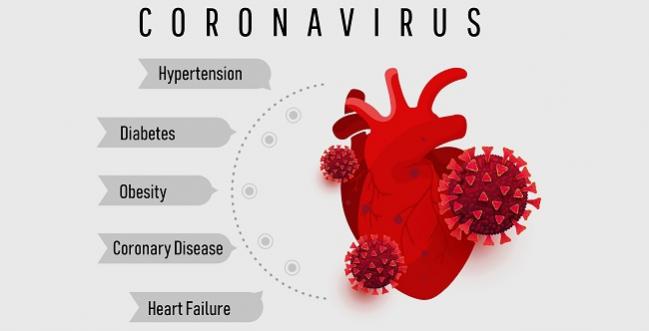Both CV Risk Factors, Complications Herald Higher COVID-19 Mortality
COVID-19 “is a disease that is linked with heart disease, that’s for sure,” stressed the author of a sweeping, global meta-analysis.

A sweeping meta-analysis combining more than 77,000 hospitalized COVID-19 patients from around the world confirms that a significant proportion have cardiovascular symptoms or develop cardiovascular complications postinfection, and shows that both are associated with a higher risk of dying.
While earlier studies have established that CV risk factors up the risk of severe COVID-19 illness, the current study is one of the largest, most geographically-diverse analysis and also zeroes in on the risks associated with cardiovascular complications.
“It is crucial for clinicians working on the front lines with cardiovascular patients to understand the clinical presentation, natural history, and risk factors for COVID-19 infection status,” lead author Jolanda Sabatino, MD, PhD (Magna Græcia University, Catanzaro, Italy), told TCTMD. “In meta-regression analyses, cardiovascular comorbidities or risk factors as well as cardiovascular complications after COVID-19 infection had a significant interaction with death. . . . Clinicians need to be aware of the potential impact of cardiovascular conditions and complications in COVID-19 patients who require more intensive and frequent cardiovascular monitoring.”
Sabatini and colleagues reported their findings August 14, 2020, in PLOS One.
The analysis combined 21 studies based on a literature search for papers focused on patients hospitalized for COVID-19 and had information on cardiometabolic risks factors or complications. Studies were international, Sabatini stressed to TCTMD, including data from China, Italy, the United States, United Kingdom, Iran, Singapore, and Korea.
For the cohort as a whole, 40.4% of patients were female, mean age was 48, and 12.9% were found to have cardiovascular comorbidities, although there was large heterogeneity among studies. The most common cardiovascular condition was hypertension (36%), and coronary artery disease had been previously diagnosed in 11.7%. One in five patients had diabetes, one in ten were smokers, and obesity and heart failure—both estimated on the basis of medical history—were present in 33.8% and 9.4%, respectively.
During their hospitalization, 14% of patients developed cardiovascular complications including myocardial injury (10.3%), angina (10.2%), arrhythmias/palpitations (18.4%), myocardial infarction (3.5%), and acute heart failure (2%).
Cardiologists: Give Guideline-Directed Care
Speaking with TCTMD, study co-author Salvatore De Rosa, MD, PhD, and senior author Ciro Indolfi, MD (both Magna Græcia University), stressed that the study unequivocally establishes the link between cardiovascular disease and increased mortality in the setting of COVID-19—something that had been questioned earlier in the pandemic. And while earlier research has demonstrated that CV risk factors independently predict a more-severe course of COVID-19, the current paper extends those findings to show that CV risk factors as well as established CVD independently predict the development of cardiovascular complications and death.
Clinicians need to be aware of the potential impact of cardiovascular conditions and complications in COVID-19 patients who require more intensive and frequent cardiovascular monitoring. Jolanda Sabatino
“Now we have enough data, with a large enough number of patients from across the world . . . that confirms this association,” De Rosa said. “So this is something we should be aware of—not only cardiologists but also any physician caring for patients with COVID-19, especially those that are at the hospital—because this association means that cardiovascular conditions and risk factors have to be looked during patient management, just to avoid a cardiovascular complication and then of course the adverse cardiovascular events that we fear most, which are the development of heart failure or, in the worst case, death.”
In the meta-regression analysis, gender and age alone did not predict outcomes, whereas CV risk factors and complications did. The patient most at risk, De Rosa added, is the older patient who also has cardiovascular disease.
This point needs to hit home with cardiologists, added Indolfi, if it hasn’t already: they need to be aggressive in treating cardiovascular disease when they see it, and to actively check for and monitor cardiovascular risk factors. The care required isn’t anything new or different with COVID-19, he stressed; rather, it’s the guideline-supported CVD management and therapies that were to some extent pushed to the back burner earlier in the pandemic, when physicians were focused solely on the virus.
“COVID-19 is not a normal influenza, it's not another pneumonia,” Indolfi stressed. “It's a disease that is linked with heart disease, that’s for sure, and if patients have cardiovascular disease, the chance to die is increased.”
Sabatino emphasized one additional aspect of the paper, which was that women in this multinational cohort made up more than 40% of hospitalized patients, a finding that undermines other published data showing that women are not as severely affected by COVID-19 as men. “Our study does not imply that women are protected from COVID-19,” she said. “In fact, gender had no significant interaction with death in our meta-regression analysis.”
Shelley Wood was the Editor-in-Chief of TCTMD and the Editorial Director at the Cardiovascular Research Foundation (CRF) from October 2015…
Read Full BioSources
Sabatino J, De Rosa S, Di SalvoI G, Indolfi C. Impact of cardiovascular risk profile on COVID-19 outcome: a meta-analysis. PLOS One. 2020;15(8):e0237131.
Disclosures
- Authors report having no relevant conflicts of interest.


Comments